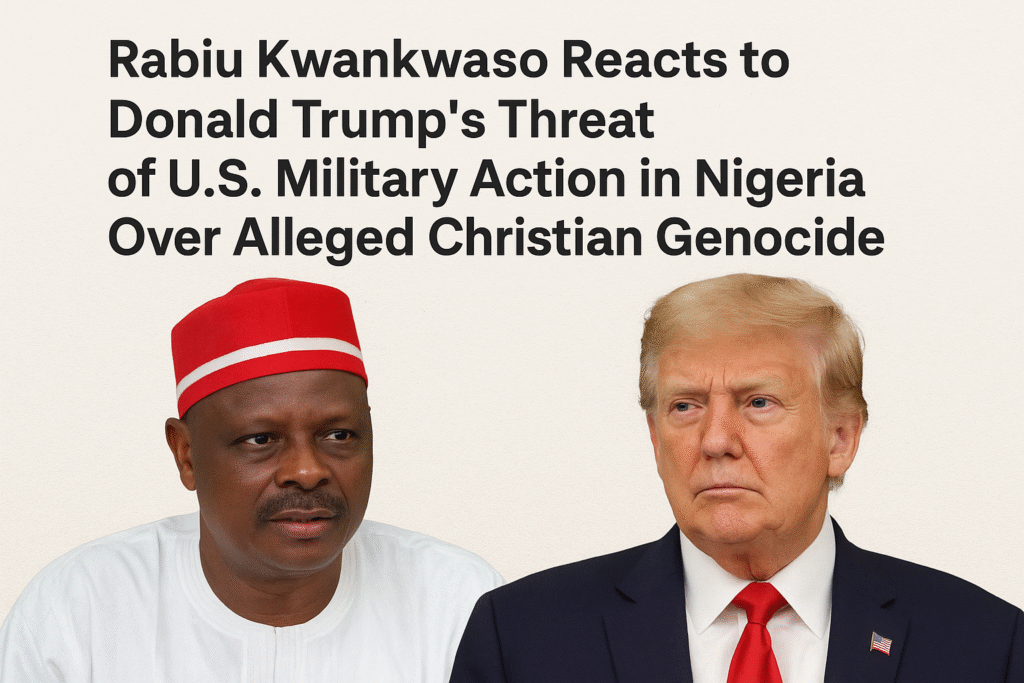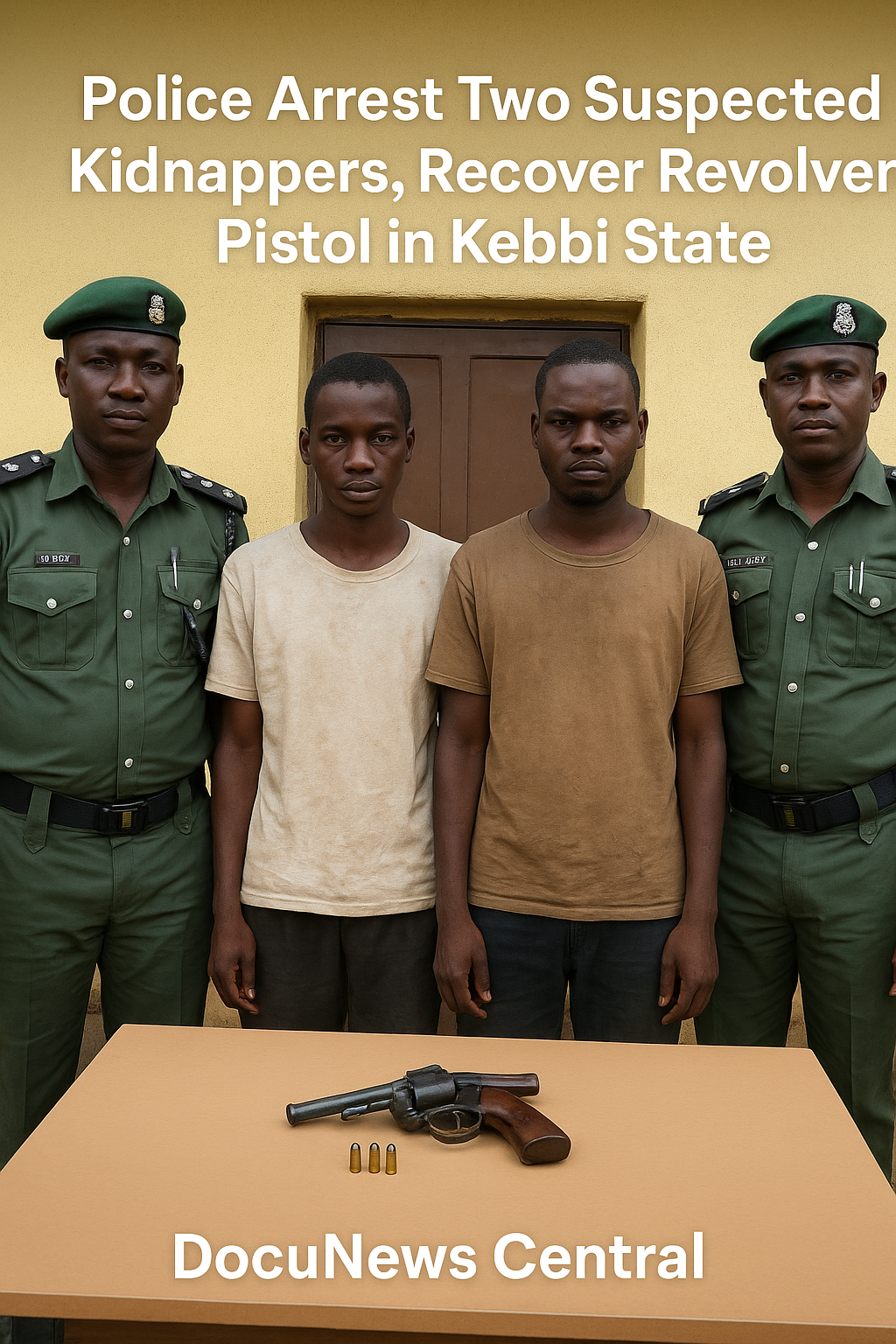

Rabiu Kwankwaso Reacts to Donald Trump’s Threat of U.S. Military Action in Nigeria Over Alleged Christian Genocide
By DocuNews Central — November 3 2025
Rabiu Kwankwaso reacts to Donald Trump threat by urging cooperation and intelligence sharing, not military intervention, as debate grows over alleged killings of Christians in Nigeria.
U.S. President Donald Trump’s recent claim that Christians are facing genocide in Nigeria has triggered widespread reactions. In response, Senator Rabiu Musa Kwankwaso—former Defence Minister and Kano State governor—urged dialogue, technology transfer, and respect for sovereignty. His calm, diplomatic tone contrasts with the heated rhetoric that followed Trump’s warning of possible U.S. military action in Nigeria.
Trump’s warning sparks global attention
During a Washington briefing, Trump said he had instructed the Pentagon to prepare “all necessary options” to stop what he called Christian persecution in Nigeria. His words immediately drew international concern and domestic pushback from Nigerian officials who rejected the description of events as a genocide.
Nigeria’s official position: rejecting the genocide label
The Federal Government dismissed the genocide classification, explaining that the violence affecting parts of the country is rooted in terrorism, banditry, and resource conflicts. Authorities emphasized that both Christians and Muslims have suffered casualties, and that Nigeria welcomes U.S. cooperation that respects its sovereignty.
Rabiu Kwankwaso’s measured response
Kwankwaso’s statement focused on national unity. He noted that security failures harm all Nigerians, regardless of faith, and asked the U.S. to support reforms instead of issuing threats. His remarks reinforced his reputation as a pragmatic leader who values diplomacy over confrontation.
“Nigeria is facing serious security challenges, but this is not about religion. The United States should assist us with intelligence and technology—not threats of military force.”
Why Kwankwaso’s voice matters
As a seasoned politician and former Minister of Defence, Kwankwaso’s insights carry weight. His Kwankwasiyya Movement promotes education, fairness, and empowerment—principles that shape his appeal for cooperation with international partners. Analysts describe his reaction as constructive and nationally unifying.

Complex realities behind Nigeria’s insecurity
Nigeria’s insecurity stems from multiple factors: extremist insurgencies, ethnic tensions, and competition over dwindling resources. Violence by Boko Haram, Islamic State West Africa, and armed bandits has taken lives across both religious lines. Framing the crisis solely as Christian persecution risks oversimplifying its root causes.
International reactions and calls for caution
Human-rights groups and African Union leaders urged restraint after Trump’s comments. They warned that any unilateral military action could destabilize West Africa. Instead, they advised deeper diplomatic engagement and investment in Nigeria’s security reforms. The United Nations also reaffirmed support for peace initiatives within Nigerian law.
Analyst opinions on the Trump–Kwankwaso exchange
Security analysts say Trump’s language may have diplomatic consequences, while Kwankwaso’s approach opens space for cooperation. Dr. Hassan Mahmoud of Abuja noted that “using the term genocide overlooks economic and environmental pressures driving much of the conflict.” He said that international partners should emphasize justice, governance, and poverty reduction rather than military pressure.
Public opinion within Nigeria
Online discussions show a split view. Some Nigerians applaud Trump’s strong tone, hoping it pressures leaders to act; others defend Nigeria’s sovereignty. Many, however, commend Kwankwaso’s composure, describing him as a statesman seeking long-term peace rather than political drama.
Potential diplomatic outcomes
Experts believe Washington and Abuja will now focus on expanding intelligence cooperation and technical training, not armed confrontation. Both sides recognize that sustained collaboration, transparency, and joint counter-terrorism programs benefit regional stability.
Religion and reporting: why balance matters
Religion influences public sentiment, but blaming one group alone fuels mistrust. Balanced reporting—acknowledging that both Christian and Muslim communities are victims—is vital. Kwankwaso’s message reminds citizens and observers that peace depends on shared effort and empathy, not division.
Conclusion: cooperation over confrontation
Rabiu Kwankwaso reacts to Donald Trump threat with a message rooted in diplomacy. While Trump’s concerns about violence deserve attention, characterizing the crisis as a Christian genocide ignores complex realities. Kwankwaso’s appeal for unity, technology, and intelligence sharing highlights the path forward: cooperation, not confrontation. Nigeria’s progress—and its partnership with the United States—will depend on respect, mutual understanding, and a collective will to end violence.
Related Articles
- Nigeria Government Rejects Trump’s ‘Country of Concern’ Designation
- Tinubu Responds to U.S. Pressure Over Human Rights
- Insecurity in Nigeria: Causes and Global Reactions
- How Religion and Politics Intersect in Nigeria’s Security Crisis

© 2025 DocuNews Central • All rights reserved • For reprints, contact editorial@docunews.example








